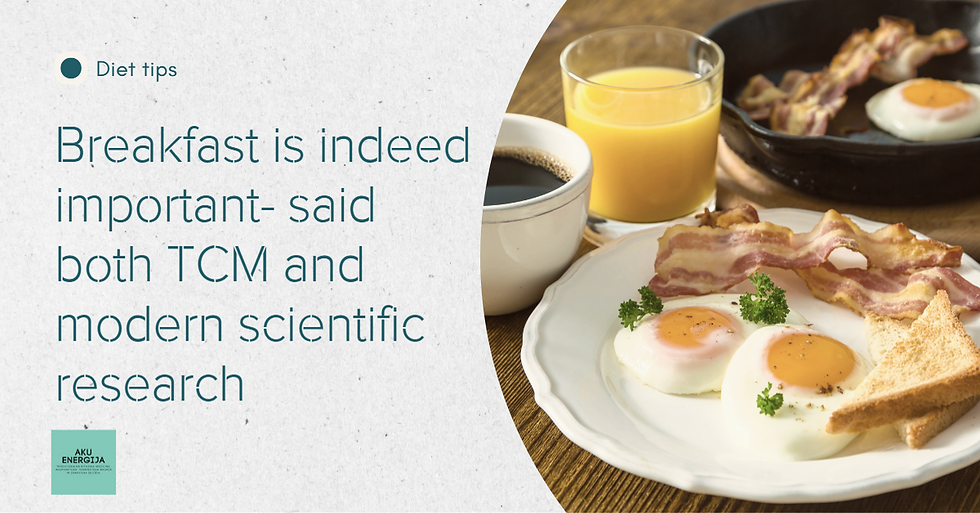Breakfast is indeed important- said both TCM and modern scientific research
- Aku Energija
- Jan 1, 2023
- 5 min read
Calories consumed should be less than calories burned. That’s the mantra for most weight-loss diets. Why, then, does this approach so often fail?
When we talk about a healthy diet, most people just focus on WHAT to eat. Whether it is weight control, relieving IBS symptoms, reducing stomach acid or boosting overall health, WHEN you eat also matters. And this is well explained in the thousand year wisdom of Traditional Chinese medicine and the morden scientific research. Researchers investigating the circadian system (internal biological clock) have started looking at the effects of mealtime on our health. Evidence supports the claims of TCM, indicating that eating meals earlier in the day might help promote weight loss and reduce the risk of chronic disease.

Biorhythms play an important role in how the body handles food. Eating in tune with the circadian rhythms—our body's inner clock that guides you to wake and sleep—automatically helps your health. By doing so, the body get the fuel to start, make the system up and running then allow time to rest and recover. As soon as you wake up, your body needs energy. If you don’t eat a good breakfast, your body is going to borrow the energy from your energy reserve (the Kidney or Essence, Jing) and develop issues in the long run.
Don't Skip Breakfast!
According to the American Heart Association (AHA), people who skip breakfast are more likely to have diabetes, heart disease, and high cholesterol. Timing of energy intake, a temporal dietary pattern, may enhance health. Eating a greater amount of energy earlier and a smaller amount of energy later in the day, a behavioral circadian rhythm, may assist with chronoenhancement. Chronoenhancement seeks to enhance entrainment (synchronization) of biological and behavioral circadian rhythms. [1] High-calorie breakfast with reduced intake at dinner is beneficial and might be a useful alternative for the management of obesity and metabolic syndrome [2] while skipping breakfast is associated with an increased risk of cardiovascular disease morbidity and mortality as well as all-cause death. [3]
The TCM Body Clock And Optimization Of The Body Function
The term 養生 Yang Sheng means nourishing life. To do so, we need to respect and synchronize with our natural rhythm. According to TCM, our bodies run on a clock, where certain functions are stronger or weaker as energy shifts and flows throughout the day. Each system has its time for optimal performance, and we can reap many health benefits by following this clock.
From 05-07, 卯時, the large intestine is the most active. If you are an early bird, it is advisable to drink a small amount of warm water, do some gentle stretching exercises then go to the toilet and empty your guts. By cleaning out the waste early, our digestive system is ready for new intake of food.
The Stomach energy is at its strongest between 07-09, 辰時, this is the best time of day to provide good quality fuel for you body. The food should be warm, nutritious and balanced. Here are some suggestions:
Slices of bread as the size of your palm with different sorts of grains
A glass of warm soy/ almond/ rice/ spelt milk
Nut butter (almond butter, black sesame tahini) or assorted nuts
Hummus, baked bean, eggs, cooked mushroom
Occasionally some jam or ham
From 09-11, 已時, the Spleen take charge and the food move on to the digestion and absorption. Besides digestion and regeneration, Spleen is also the system that purifies blood and control the intellectual activities. Skipping breakfast and reaching for a coffee and a sugary or greasy snack at 10.30am will disturb the Spleen function, resulting in digestive dysfunction, lack of concentration and weight control challenges.
Midday Rest Around Noon Followed By The Biggest Meal Of The Day- Lunch
Midday marks the highest energy point when the Yang is predominant and the Heart functions at its peak around 11-13, 午時. To avoid overstimulation, take a short break, do some deep breathing and shut your eyes to nourish Yin energy to balance with the Yang.
Lunch should be your biggest meal of the day and it is the most optimal around noon. Eat hot food with whole grains, plenty of cooked vegetables with a small portion of meat and some seasonal fruits.
The Small Intestine energy comes into it’s peak between 13-15, 未時, this is when much of the nutrient absorption takes place. Do some light work after lunch and avoid intensive physical activity that might disturb the digestive system.
15-17, 申時 is the time of the Bladder which is the longest meridian of the body and have connections with all other systems. This is the time when our metabolism is the most active. Make use of the productive time for your work or study. If possible, do some sport training around these hours.
Dinner Should Be Early And Light- but DO EAT something
By the evening, the day light gradual dim and the body needs buffer to calm down from the vigorous day. Now is the time to wind down from the days work and gently nourish the body. The Kidney function is at its peak between 17-19, 酉時. The Kidney system is the main energy reserve that in charge of our genetic, reproductive function, memory and aging. By this time, finish working and reward yourself with a light evening meal. The composition can be similar to the lunch, but less fatty and lower in portion.
Time Management And Organization Is The Key
For many people, starting the day with breakfast is “difficult”, like the lack of time or appetite. It is easy to overcome with a little organization. A lack of appetite can be a sign of a weak digestive system making it all the more important to start your day with gentle nourishment. If you do struggle with ideas of breakfast or can’t swallow much food, a glass of warm rice milk or small bowl of millet congee could be a good choice. Try to combine with acupuncture and Chinese herbal medicine to reset and readjust the systemic functions and soon the circadian system can be restored.
Hollie A. Raynor, Fan Li, Chelsi Cardoso, Daily pattern of energy distribution and weight loss, Physiology & Behavior, Volume 192, 2018, Pages 167-172, ISSN 0031-9384, https://doi.org/10.1016/j.physbeh.2018.02.036.
Jakubowicz, D., Barnea, M., Wainstein, J. and Froy, O. (2013), High Caloric intake at breakfast vs. dinner differentially influences weight loss of overweight and obese women. Obesity, 21: 2504-2512. https://doi.org/10.1002/oby.20460
Ofori-Asenso R, Owen AJ, Liew D. Skipping Breakfast and the Risk of Cardiovascular Disease and Death: A Systematic Review of Prospective Cohort Studies in Primary Prevention Settings. J Cardiovasc Dev Dis. 2019 Aug 22;6(3):30. doi: 10.3390/jcdd6030030. PMID: 31443394; PMCID: PMC6787634.







Comments